‘Black Box’ shows hearing is believing
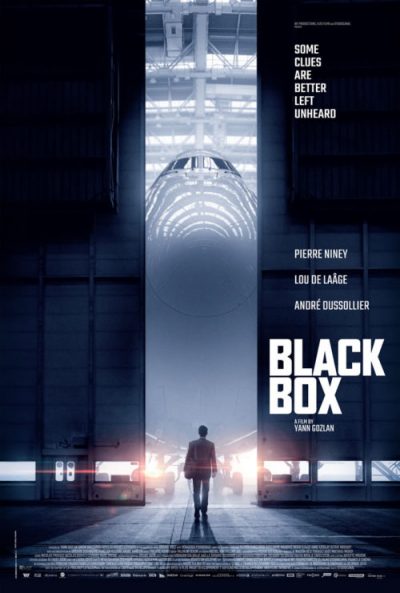
“Black Box” (“Boîte noire”) (2021 production, 2022 release). Cast: Pierre Niney, Lou de Laâge, André Dussollier, Sébastein Pouderoux, Olivier Rabourdin, Guillaume Marquet, Mehdi Djaad, Aurélien Recoing, Grégori Derangère, Anne Azoulay, Marie Dompnier, Octave Bossuet. Director: Yann Gozlan. Screenplay: Nicolas Bouvet, Yann Gozlan, Jérémie Guez and Simon Moutairou. Web site. Trailer.
We all have that little voice in our heads that we call “intuition.” We know it’s there, and sometimes its messages can be quite insistent. But how often do we actually listen to what it has to say? We frequently treat it dismissively, not taking it seriously. Since it lacks a certain tangibility, and because the content of its dispatches often defies logic and rationality, we tend to cast it aside, often at our own peril. However, there are ways to give it more credibility, such as when its messages are backed by physical evidence that bears out its contentions. Suddenly those once-dubious purely intangible notions take on a greater degree of plausibility, ideas genuinely worth heeding. Such is the experience of a gifted listener in the new French thriller, “Black Box” (“Boîte noire”).
Government aviation technician Mathieu Vasseur (Pierre Niney) has established quite a name for himself as a crash investigator. Thanks to his keen sense of hearing, he often uncovers evidence of the causes of these disasters that his peers overlook. That’s because this critical evidence is often auditory in nature, taking the firm of revealing sounds that are deeply buried within the aircrafts’ cockpit voice recorders (CVRs, devices more commonly called the planes’ “black boxes”) that are recovered after the crashes. Mathieu has become so proficient at this that he’s often looked upon as “the go-to guy” when these incidents occur.
However, when a plane on a flight from Dubai to Paris unexpectedly (and inexplicably) crashes, Mathieu is excluded from the investigation team. Mathieu is mystified by the decision, which is handed down to him by his supervisor, Victor Pollock (Olivier Rabourdin), who generally treats his associate as his right-hand man. Something doesn’t add up here, and Mathieu wants to know why the investigation is proceeding without his expertise.
In the ensuing days, circumstances take additional unexpected turns. Mathieu’s supervisor mysteriously disappears, a development that the aviation agency keeps quiet. Meanwhile, public pressure to find the cause of the crash grows, fueled by media speculation, particularly since there was no apparent reason for its downing. So what really happened?
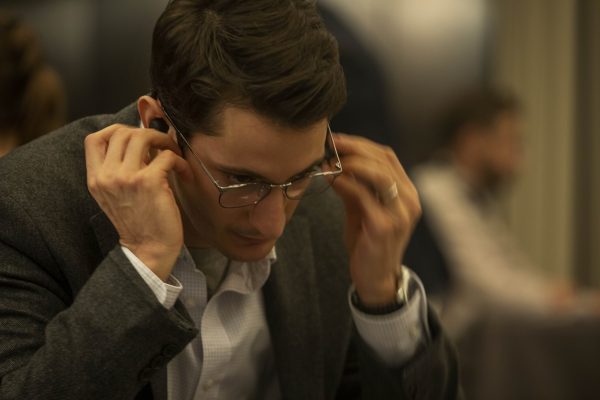
At this point, the head of the aviation agency, Philippe Rénier (André Dussollier), steps in and takes charge to expedite matters; as the boss, and with his supervisor nowhere to be found, he’s willing to take proactive measures to get to the bottom of things. He wants answers, and he’s at a loss to understand why Pollock didn’t appoint Mathieu to the team in the first place. So, in light of these developments and growing pressure to come up with an official explanation, Rénier assigns his gifted associate to the investigation.
The prevailing theory at the time Mathieu joins the investigation is that the aircraft was brought down by a terrorist on board the plane, based on black box recordings of inflammatory vocal rhetoric in the cockpit. And, on a cursory review, that confrontative audio would seem to support the working theory, something with which Mathieu initially concurs. He and Rénier subsequently appear at a press conference, hoping that this explanation will quell much of the public speculation. But does it?
Mathieu is not so sure of these findings, despite the blessing he appeared to have given it at the press conference. Upon further scrutiny, he begins stumbling upon disquieting evidence of other possible explanations, despite the apparent authenticity of the arguing that was recorded in the cockpit. And it’s that keen sense of hearing that begins tipping him off to other potentially plausible scenarios.
The possible causes that Mathieu uncovers are based on some rather far-fetched conclusions reached after applying his own unique investigatory techniques, especially the information he derives from interviews with a seasoned pilot, Alain Roussin (Grégori Derangère), who doesn’t have particularly kind things to say about the aircraft model in question. But, no matter how outlandish these alternate explanations may seem, they fit the evidence that steadily surfaces. And, the further Mathieu looks, it becomes quite troubling who might be involved in this scenario, including the head of the aircraft manufacturer, Claude Varins (Aurélien Recoing), the head of the company that designed the aircraft’s security systems, Xavier Renaud (Sébastein Pouderoux), and even Mathieu’s wife, Noémie (Lou de Laâge), a onetime government aircraft design analyst who has just landed a lucrative position with Varins’s firm.
When Mathieu presents his evidence to Rénier, the agency head is reluctant to agree with his associate’s findings. But, considering what Mathieu found, Rénier can’t bring himself to summarily dismiss the evidence out of hand. He gives Mathieu permission to keep digging, despite the fact that he knows the investigation might produce conclusions that could result in considerable blowback. But, when the duo considers what could be involved, they’re convinced that the truth must come out, no matter how damning it might be.
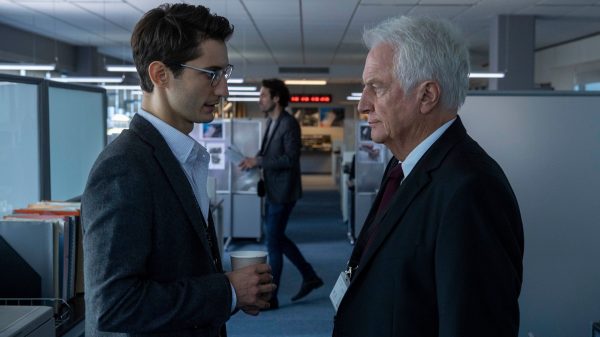
The implications in all this are staggering. In addition to revealing what may have actually happened to the plane, the question of Pollock’s unexplained disappearance remains. Then there’s Mathieu’s professional credibility, which could be ruined unless he receives backing from objective sources, such as a sympathetic journalist (Anne Azoulay) whose reporting could lend legitimacy to his cause. And, on a personal level, the future of Mathieu’s marriage is also at stake if he were to learn that his wife hasn’t been honest with him.
It’s a lot for Mathieu to process, especially when his life appears to be threatened, too. But, when he “hears” the truth – no matter how unconventional it may seem – can he realistically stay silent and deny it? What’s more, will the many challenges now surrounding Mathieu keep him from believing what he knows to be the truth – and what he must do to reveal it? The events that are unfolding may push him into making hard choices that his work has never prepared him for. Being willing to think unconventionally – including listening to intuitive insights that may be difficult to fathom and abide by – could prove to be essential to his salvation – and his very survival.
This becomes apparent as the crash investigation plays out. While the audio recordings and the intuitively derived beliefs that stem from them provide Mathieu with a good start, he must draw upon the leads provided by other intuitively based beliefs the further he gets into his inquiry. For example, as the once-uninvolved players in this story emerge from the shadows and step to the forefront, Mathieu must foster conclusions about their roles in this scenario by parceling together his findings and formulating beliefs about them in hopes that they’ll lead him to the answers he’s seeking. And, considering his proficiency at managing these beliefs, he’s truly capable at coming up with the evidence he needs to solve the mystery and to protect his own hide in the process.
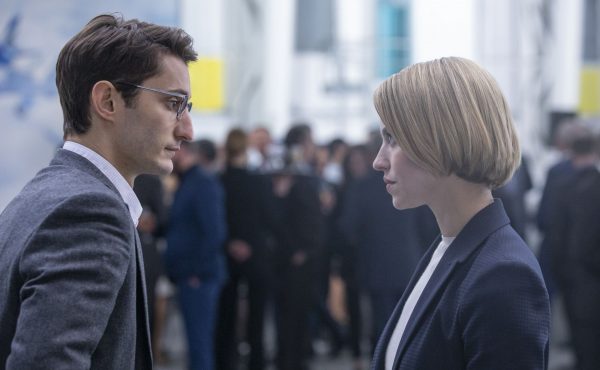
Even when it comes to deciphering the thorny enigmas of this investigation, Mathieu has a knack for knowing how and where to look to find the evidence he needs. This becomes obvious when he delves into the disappearance of his supervisor. Like a skilled bloodhound, he follows his nose and picks up the scent of the proverbial trail. His intuition provides him with the beliefs he needs to lead him to clues that offer insight into Pollock’s role in the story, a revelation that subsequently unlocks a chain of additional valuable clues underlying the crash mystery.
Using intuition in situations like this is a skill we all innately possess, and Mathieu’s practice of it sets a fine example that we can all draw upon in unraveling the puzzles we face. Considering the multiple ways he employs it, he’s certainly become well-practiced in its use, and there’s no reason that we can’t do the same. However, there are several principles he draws upon in enhancing the effective use of this tool, and we’d be wise to follow suit.
For example, Mathieu obviously places tremendous faith in the value of his intuition, and that’s perhaps the most important enhancement principle to bear in mind. As noted previously, intuition is something that many of us treat skeptically, and that intrinsic doubt, in turn, can undermine its effectiveness. Indeed, if we look upon it dismissively, we may lose out on the valuable input it can supply. That can be crucial when we’re faced with handling dicey situations, not unlike those that Mathieu experiences in terms of his credibility and personal safety as this story unfolds.
Likewise, Mathieu has overcome the fears and limitations that are often associated with openly employing tools like intuition that may be regarded as unconventional or even preposterous. Oftentimes, when we draw upon resources that are prone to ridicule, we may be hesitant to make use of them to the extent we could, if at all. Not only could that hinder our effectiveness at uncovering the solutions we seek, but it could also put us in jeopardy, personally and professionally. To his credit, Mathieu has no hesitation to make the most of his intuition and what it can do for him, advice we’d be wise to follow.
If nothing else, Mathieu’s experience illustrates that our intuition is nothing to be underestimated, even if it’s something that often takes a back seat to our intellect. While our intellect certainly shouldn’t be undervalued, the same should be said for our intuition as well. Indeed, if it served no purpose, then why do we possess it? It deserves equal treatment at the very least, especially when we’re willing to see what it can do for us. That’s important when the stakes are high, as is the case here. With so much on the line, hearing truly could be believing.
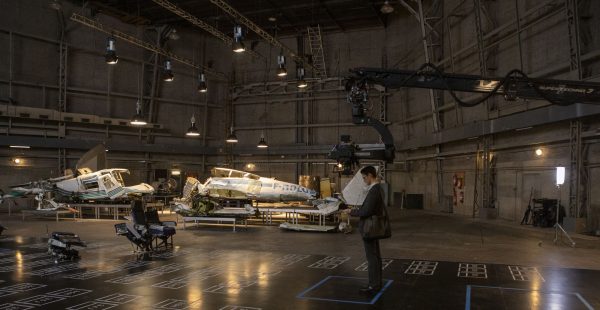
When it comes to this picture, the first thought that comes to mind for me is, “Talk about a helluva movie!” Writer-director Yann Gozlan’s stylish, suspenseful thriller follows a plane crash investigation conducted by a diligent, talented aviation technician whose dogged determination won’t let him stop, particularly when a number of suspicious smoking guns begin turning up, some of which hit close to home and begin placing his credibility, and even his personal safety, in danger. Despite a slight tendency to drag a bit in the second hour, this contemporary noir-esque offering gets virtually everything else right. Its inventive cinematography, excellent film editing, engaging soundtrack and fine performances mesh perfectly, and the slow-simmering pace is ideal as clues are meticulously doled out in carefully measured parcels, much like what one might find in the pictures of Alfred Hitchcock, Brian DePalma and Roman Polanski. In fact, in many ways, the structure of this release is strongly reminiscent of Polanski’s chilling and captivating slowburn thriller, “The Ghost Writer” (2010), a comparable edge-of-your-seat offering, to be sure.
For its efforts, “Black Box” captured five 2022 nominations at the Cesar Awards, the French equivalent of the Oscars, with nods for best actor, screenplay, music, sound and editing. In light of its accolades and popularity in France, I’m truly mystified why this picture hasn’t received wider attention or distribution domestically, having played in extremely limited theatrical release in 2022. Thankfully, though, it’s now available for streaming online and home media. If you’re looking to watch something that will hook you and take you on a spellbinding thrill ride, give this one a look; you won’t regret it.
They say that “seeing is believing,” but, as this film so clearly shows, it’s a principle not limited to our visual sense. However, in this case, I’m not talking just about one’s auditory capabilities; I’m also referring to the value of that so-called sixth sense that we all possess but tend to ignore. Our intuition truly merits the same recognition and attention as the other five senses that we take for granted and unquestioningly make use of when it comes to understanding and appreciating our world. And, when we sincerely see what that sixth capability can do for us, we just might be willing to elevate the level of its importance. That could reshape how we view our existence and how it patently manifests, providing new insights that truly could make us committed believers.
Copyright © 2023, by Brent Marchant. All rights reserved.



